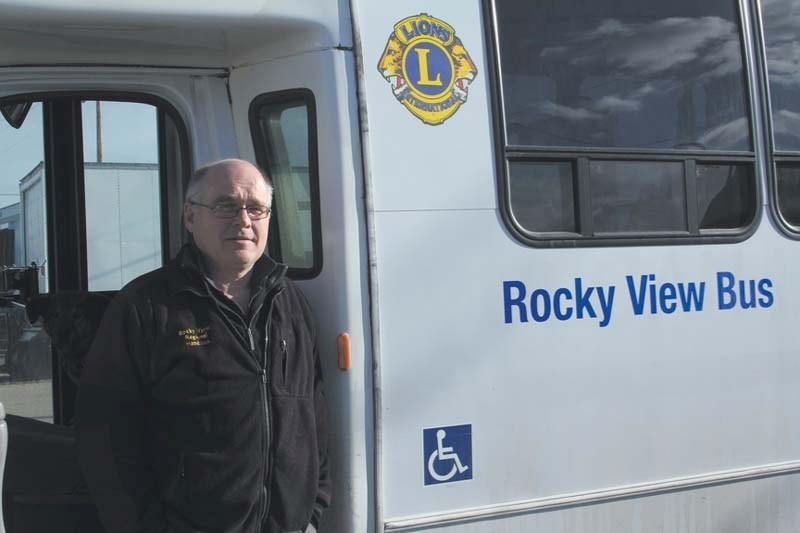The Rocky View Regional Handibus is seeing ridership numbers within 10 per cent of pre-pandemic figures and has grown its registration list by 20 per cent in the first six months of this year.
Despite the good news, the bus service is still seeing some inefficiencies due to the pandemic and the negative impact of high costs of fuel, parts, and wages.
“We made it through the pandemic with great support from the participating municipalities, with some really great staff who managed to deal with slow days and such,” said Paul Siller, general manager of the Rocky View Regional Handibus Society.
“Not everyone needs transportation every day but there are people trying to get to chemotherapy appointments weekly and dialysis and such. I'm pretty sure we're going to get busier.”
The Rocky View Regional Handibus Society has provided subsidized transportation to residents in Airdrie, Rocky View County, Chestermere, Crossfield, and Cochrane since 1980. In the early 2000s, the service opened up to residents beyond seniors and people with disabilities.
“There's actually a group of people stuck because they don't drive and don't have access [to transportation]. Here outside of the city limits of Calgary there are not a lot of other options,” Siller said. “We called the program the Rocky View Handibus and our goal is to help connect people to the supports and services they need to stay independent.”
The service is somewhat limited as rides are only offered between 7:30 a.m. and 4:30 p.m. from Monday to Friday, including 10 round trips or 20 one-way trips weekly per registered rider.
Siller said this makes the service less than ideal for anyone trying to get to work or the airport, but great for medical appointments, visiting loved ones, or even getting groceries.
The destinations must be relatively local and must be booked ahead of time. Riders pay a subsidized fare of $4 per 10 kilometres, Siller stated.
Funding for the program is provided through several municipalities including Rocky View County, Town of Crossfield, Town of Cochrane, and City of Chestermere, he added, allowing elderly and those with disabilities to reside on their acreages, farms, or in rural communities for a longer period of time.
“By working with the four municipalities and taking a regional approach, we're able to mingle passengers,” Siller said.
The bus may pick up several passengers in different communities while dropping them off for their various appointments. This model allows the service to be more efficient and cost-effective.
COVID-19 public health restrictions at some medical facilities made this model less effective as waiting rooms were closed and customers could no longer be dropped off ahead of their appointment.
For example, one person would normally be dropped off early if two people were going to appointments at 10 a.m. in different locations. The service is still encountering this inefficiency at several places that won’t allow patients to wait inside, according to Siller.
Aside from that inefficiency, the service has also dealt with rising fuel costs, higher wages, downsized staff, and more expensive parts.
Siller estimated the costs of operating buses have gone up by 20 per cent due to supply chain issues.
Four years ago, the Society planned to raise passenger fares for the summer of 2020, which was paused due to the uncertainties of the pandemic.
Siller wrote in an email the Society may have to revisit a fare increase for fall 2022, but he stated no decisions have been made yet.
“We also have to be mindful that support for people on a fixed income has not really changed. It's not like a lot of people have a lot of ability to take [a price increase] on,” Siller said. “We have not changed our fare structure since we implemented it about a decade ago.”
Siller hopes they can host some fundraising events and receive enough funds from municipalities to keep the fare structure low.
“It will have to go up sometime as everything has gone up,” he concluded on the issue.
Recently, the Society raised enough funds, in the amount of $120,000, to purchase a new bus to improve their level of service. They are now waiting for a response to a grant application that will extend the society's purchasing power for new buses.
Siller expects an answer in September. The service is currently operating with 18 wheel-chair accessible vehicles.
To register for the service, residents fill out a form to provide their address, emergency contact information, and questions about their abilities. Siller explained it’s important for the driver to understand any disability residents may have in order to better serve that customer.
With the increase in ridership demand, people are asked to book by noon on the business day before travel if space is still available.
Provincial COVID-19 guidelines for public transit have been withdrawn, however, enhanced cleaning of Rocky View buses is still continuing, social distancing is still expected as much as can be practically done, and face masks while traveling are recommended.
For more information, go to rockyviewbus.ca




